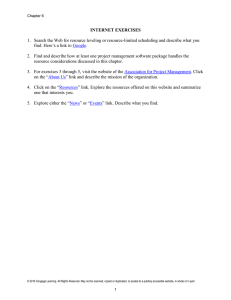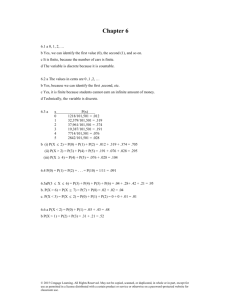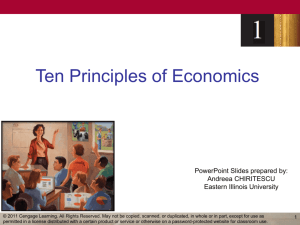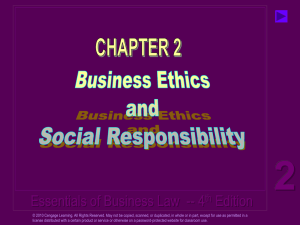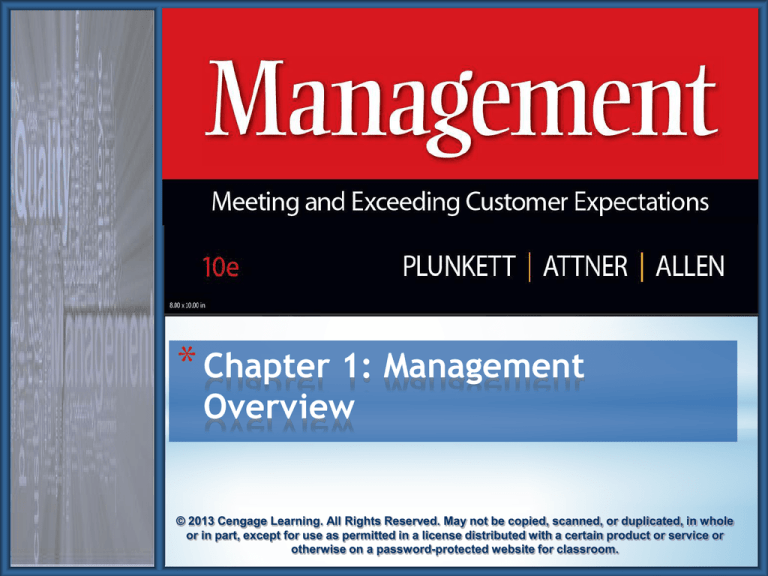
* Chapter 1: Management
Overview
PowerPoint
Presentation by
Charlie Cook
The University of
West Alabama
© 2013 Cengage Learning. All Rights Reserved. May not be copied, scanned, or duplicated, in whole
or in part, except for use as permitted in a license distributed with a certain product or service or
otherwise on a password-protected website for classroom.
*Learning Objectives
After reading and studying this chapter, you should
be able to:
1.
2.
Explain why organizations need managers
3.
4.
5.
Identify three levels of management
6.
Summarize ten management roles
Outline factors that affect a manager’s
universe
Describe five management functions
Apply management functions to each level of
management
©2013 Cengage Learning. All Rights Reserved. May not be copied, scanned, or duplicated, in whole or in
part, except for use as permitted in a license distributed with a certain product or service or otherwise
on a password-protected website for classroom.
1–2
*Learning Objectives (Cont.)
After reading and studying this chapter, you should
be able to:
.
7.
8.
Analyze three management skills
9.
Discuss the criteria used to evaluate a
manager’s performance
Contrast the myths with the realities of
a manager’s job
1–3
© 2013 Cengage Learning. All Rights Reserved. May not be copied, scanned, or duplicated, in whole or in part, except for use as
permitted in a license distributed with a certain product or service or otherwise on a password-protected website for classroom.
*Management and Managers
* Managers
* People who allocate and oversee the use of
resources
* Management
* One or more managers individually and
collectively setting and achieving goals by
exercising related functions and coordinating
various resources
© 2013 Cengage Learning. All Rights Reserved. May not be copied, scanned, or duplicated, in whole or
in part, except for use as permitted in a license distributed with a certain product or service or otherwise
on a password-protected website for classroom.
1–4
*Management and Managers (cont’d)
* Goal
* An outcome to be achieved or a destination to be
reached over a period of time through the exercise of
management functions and the expenditure of resources
* Objective
* A short term goal that is achieved in less than a year
* Specific
* Measurable
* Attainable
* Results-oriented
* Time-limited
© 2013 Cengage Learning. All Rights Reserved. May not be copied, scanned, or duplicated, in whole or
in part, except for use as permitted in a license distributed with a certain product or service or otherwise
on a password-protected website for classroom.
1–5
* Organizational Need for Managers
* Organization
* An entity managed by one or more persons to achieve
stated goals
* Basic Tasks of Management (Drucker)
* Running a business
* Building an organization
* Coordinating activities while accepting the values and
goals of the organization
* Values constitute beliefs and basic tenets that are
important and meaningful to those individuals and
organizations that hold them.
1
© 2013 Cengage Learning. All Rights Reserved. May not be copied, scanned, or duplicated, in whole or
in part, except for use as permitted in a license distributed with a certain product or service or otherwise
on a password-protected website for classroom.
1–6
*The Manager’s Universe
* Constant change in business requires that
managers and organizations meet needs for:
* Pleasing customers
* Improving products and services continuously
* Providing leadership
* Acting ethically
* Valuing diversity in their employees
* Learning to cope with global challenges
2
© 2013 Cengage Learning. All Rights Reserved. May not be copied, scanned, or duplicated, in whole or
in part, except for use as permitted in a license distributed with a certain product or service or otherwise
on a password-protected website for classroom.
1–7
*Levels of Management
Top
Management
The chief executive officer (CEO) and/or
president and his, her, or their immediate
subordinates, usually called vice presidents
Middle
Management
Includes managers below the rank of vice
president but above the supervisory level
First-Line
Management
Supervisors, team leaders, and team facilitators
who oversee the work of nonmanagement
people (e.g., operative employees)
Functional
Managers
Managers whose expertise lies primarily in one
or another of the specialty areas—marketing,
operations, finance, and human resources
3
© 2013 Cengage Learning. All Rights Reserved. May not be copied, scanned, or duplicated, in whole or
in part, except for use as permitted in a license distributed with a certain product or service or otherwise
on a password-protected website for classroom.
1–8
*Management Functions
Planning
Controlling
Organizing
Management
Staffing
Leading
4
© 2013 Cengage Learning. All Rights Reserved. May not be copied, scanned, or duplicated, in whole or
in part, except for use as permitted in a license distributed with a certain product or service or otherwise
on a password-protected website for classroom.
1–9
*Management Functions
* Planning
* Foundation for the other functions
* Identify goals and ways to achieve them
* Assign priorities to each goal
* Determine the resources required
* Determine actions that commit:
* individuals
* departments
* entire organization
© 2013 Cengage Learning. All Rights Reserved. May not be copied, scanned, or duplicated, in whole or
in part, except for use as permitted in a license distributed with a certain product or service or otherwise
on a password-protected website for classroom.
1–10
*Management Functions (cont’d)
* Organizing
* Creates a structure in meeting goals by:
* Determining the tasks to be accomplished
* Grouping these tasks by employee position
* Deciding on the relationships the positions
have to one another
© 2013 Cengage Learning. All Rights Reserved. May not be copied, scanned, or duplicated, in whole or
in part, except for use as permitted in a license distributed with a certain product or service or otherwise
on a password-protected website for classroom.
1–11
*Management Functions (cont’d)
* Staffing
* Execute HR management activities:
* Determine skills and experiences of each position
* Determine number of persons needed
* Train employees for positions
* Leading
* Help organization and employees achieve goals
* Serve as role models for expected behaviors
* Coach, counsel, inspire, and encourage
* Communicate and listen
* Respond to concerns and resolve disputes
© 2013 Cengage Learning. All Rights Reserved. May not be copied, scanned, or duplicated, in whole or
in part, except for use as permitted in a license distributed with a certain product or service or otherwise
on a password-protected website for classroom.
1–12
*Management Functions (cont’d)
* Controlling
* Mechanism to ensure things go according to plan
* Prevent, identify, and correct deviations from
guidelines
* Identify and correct the causes of deviations
© 2013 Cengage Learning. All Rights Reserved. May not be copied, scanned, or duplicated, in whole or
in part, except for use as permitted in a license distributed with a certain product or service or otherwise
on a password-protected website for classroom.
1–13
*Management Skills
Technical
Skills
Human
Skills
Conceptual
Skills
The abilities to use the processes, practices,
techniques, and tools of the specialty area a
manager supervises
The abilities to interact and communicate
successfully with other persons
The mental capacity to conceive and
manipulate ideas and abstract relationships
7
© 2013 Cengage Learning. All Rights Reserved. May not be copied, scanned, or duplicated, in whole or in
part, except for use as permitted in a license distributed with a certain product or service or otherwise on
a password-protected website for classroom.
1–14
* Evaluating a Manager’s Performance
* Managers are evaluated by:
* How effectively they play the three sets of management roles
* Whether they possess and properly apply management skills
* How effective they are in setting objectives and achieving goals
* How efficiently they use their talents and resources
* How well they demonstrate leadership
* Whether they act ethically
* How effectively they make use of the diversity of their people
* How effectively they and their people please customers
9
© 2013 Cengage Learning. All Rights Reserved. May not be copied, scanned, or duplicated, in whole or
in part, except for use as permitted in a license distributed with a certain product or service or otherwise
on a password-protected website for classroom.
1–15
*Key Terms
* conceptual skills
* customer
* customer relationship management (CRM)
* diversity
* ethics
* first-line management
* functional managers
* goal
* human skills
* Leadership
* management
* management hierarchy
* manager
* middle management
* organization
* quality
* role
* technical skills
* technology
* top management
* Web 2.0
© 2013 Cengage Learning. All Rights Reserved. May not be copied, scanned, or duplicated, in whole or
in part, except for use as permitted in a license distributed with a certain product or service or otherwise
on a password-protected website for classroom.
1–16


